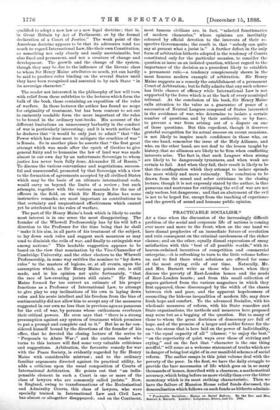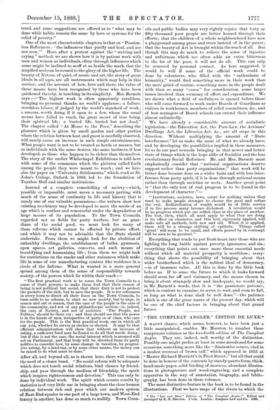PRACTICABLE SOCIALISM.*
AT a time when the discussion of the increasingly difficult problem of the social and corporate life of nations is coming ever more and more to the front, when on the one hand we have dismal prophecies of an immediate future of revolution and ruin consequent on the criminal carelessness of the richer classes ; and on the other, equally dismal expressions of smug satisfaction with this " best of all possible worlds," with its heaven-ordained incentives of competition and commercial enterprise,—it is refreshing to turn to the little volume before us, and to find there what solutions are offered for some of the most crying evils of our time. Naturally, Mr. and Mrs. Barnett write as those who know, when they discuss the poverty of East-London homes and the needs: of East-London hearts ; and from this small collection of papers gathered from the various magazines in which they first appeared, those discouraged by the width of the chasm between rich and poor, and the apparent hopelessness of reconciling the hideous inequalities of modern life, may draw fresh hope and comfort. To the advanced Socialist, with his wholesale measures of reform, with his State remedies and State organisations, the methods and measures here proposed may seem but as a begging of the question. But to many of those to whom the great doctrines of democracy are full of hope, and of the promise of a larger and nobler future for the race, the stress that is here laid on the power of individuality, on " the equal capacity of all " (classes) " to enjoy the best," " on the superiority of quiet ways over those of striving and crying," and on the fact that " character is the one thing needful," will come as a welcome statement of truths which are in danger of being lost sight of in our manifold schemes of social reform. The earlier essays in this joint volume deal with the poverty of the poor. In the first, we have the daily struggle to provide the bare necessaries of life which goes on in so many
thousands of homes, described with a clearness, a mathematical accuracy, which bring before us more vividly than ever the bitter monotony which is its most striking characteristic. Then we have the failure of Mansion House relief funds discussed, the demoralisation which follows on such funds as hitherto adminis-
• Practicable Socialism : Essays on Social Reform. By the Rev. and Mrs. Samuel A. Barnett. London Longman, Green, and Co. 1988,
tered, and some suggestions are offered as to " what may be done while habits remain the same by laws or systems for the relief of poverty."
One of the most characteristic chapters is that on " Passion- less Reformers : the influences that purify and heal, and are not seen.' " Here, after a protest against the " striving and crying" method, we are shown how it is by patient work with men and women as individuals, often through influences which some might be inclined to scoff at as beside the mark, that the stupified soul can be roused to the glory of the higher life. The beauty of Nature, of quiet, of music and art, the story of great ideals in all ages, are all instruments which may help in this service; and the account of how, here and there, the value of these means have been recognised by those who have been quickened thereby, is touching in its simplicity. Mrs. Barnett says :—" The highest work is often apparently resultless, bringing no personal thanks, no world's applause ; a failure, worthless labour, if judged by the world's standard of work ; a success, worth doing, if it open to a few, whom the usual means have failed to reach, the great secret of true being, their spiritual life ; a buried life, buried but not dead."
The chapter called " At Home to the Poor," describing the pleasure which is given by small garden and other parties where the relation between host and guest is carefully observed, will surely cause an increase in such simple entertainments.
What people want is not to be treated as herds or masses, but as individuals with the same desires, the same instincts, if less developed, as those who happen to be richer than themselves.
The story of the earlier Whitechapel Exhibitions is told here with some of the comments which the pictures called forth among the people they were meant to reach ; and we have also the paper on "University Settlements," which, read at St. John's College, Oxford, in 1883, led to the foundation of Toynbee Hall and similar institutions.
Instead of a complete remodelling of society—which, possible or impossible, must mean a necessary parting with much of the sense of continuity in life and history that is surely one of our valuable possessions—the writers show how existing machinery may be developed to meet the needs of an age which is restless and remorseful under the degradation of large masses of its population. To the Town Councils, regarded not as fields for party warfare, but as guar- dians of the social good, we must look for many of those reforms which cannot be effected by private effort, and which it may not be advisable that the State should undertake. From them we might look for the abolition of unhealthy dwellings, the establishment of baths, gymnasia, open spaces, art galleries, concerts, and such means of beautifying and humanising life ; from them we might look for restrictions on the smoke and other nuisances which make
life in some of our manufacturing centres like residence in a circle of the Inferno. What is wanted is a more general spread among them of the sense of responsibility towards society, of the powers which lie within their reach:—
"The first practical work is to rouse the Town Councils to a sense of their powers ; to make them feel that their reason of being is not political but social, that their duty is not to protect the pockets of the rich, but to save the people. It is for reformers in every town to direct all their force on the Town Councils, to turn aside to no scheme, to start no new society, but to urge, in season and out of season, that the care of the people is the care of the community, and not of any philanthropic section—is, indeed, the care of Society, and not of societies. ' The People, not Politics,' should be their cry ; and they should see that the power is in the hands of men, irrespective of party or of class, who care for the people. This is the first practical work, one in which all can join, whether he serves as elector or elected. It may be that efficient administration will show that without an increase of rating, a sufficient fund may be found to do all that needs doing ; but if this is not the case, the social interest which is aroused will act on Parliament, and that body will be diverted from its party politics to consider how, by some change in taxation, by progres- sive rating, by a land-tax, or by some other means, the money can be raised to do what must be done."
After all, and beyond all, as is shown here, there will remain the need of a closer bond. " No social reform will be adequate which does not touch social relations, bind classes by friend- ship, and pass through the medium of friendship the spirit which inspires righteousness and devotion." This can only be done by individual work. The spirit which counts results by statistics is of very little use in bringing about the close human relation between rich and poor which our modern system of East-End squalor in one part of a large town, and West-End luxury in another, has done so much to nullify. Town Conn- cils and public bodies may very rightly rejoice that forty or fifty thousand poor people are better housed through their efforts ; that the children of a whole neighbourhood have now a playground among grass and trees instead of in the gutter ; that the beauty of Art is brought within the reach of all. But though this may do much to relieve the sense of injustice and unfairness which too often adds an extra bitterness to the lot of the poor, it will not do all. This can only be removed by personal contact. As here suggested, it would be well if some of the official work could be done by volunteers, who, filled with the " enthusiasm of humanity," would find something more in their work than the mere grind of routine, something more in the people dealt with than so many " cases " for consideration, some larger issues involved than economy of effort and expenditure. We are shown what a field of usefulness is opened before those who will come forward to work under Boards of Guardians as visitors in workhouses, members of relief committees, &c., and of how managers of Board schools can extend their influence almost unlimitedly.
We have already a considerable amount of socialistic legislation,—the Education Act, the Poor-Law, the Artisans' Dwellings Act, the Libraries Act, &c., are all steps in this direction. Without multiplying the amount of " State interference," let us make the most of what we already have, and by developing the possibilities implied in these measures, let us do our part towards bringing in that newer and better state of things which is the hope alike of Socialist and the less revolutionary Social Reformer. Mr. and Mrs. Barnett most emphatically consider that " national organisations deserve support rather than party organisations ;" that work will be better done because done on a wider basis and with less inter- ference from party spirit, if it is done through national means rather than through societies or sects. Another great point is " that the only test of real progress is to be found in the development of character :"—
" Institutions, societies, laws, count for nothing unless they tend to make people stronger to choose the good and refuse the evil. Redistribution of wealth would be of little service if in the process many became dishonest. A revolution would be no progress which put one selfish class in the place of another. The test, then, which all must apply to what they are doing is its effect on character, and this test, rigorously applied, will make safe all methods, both new and old. When it is applied, there will be a strange shifting of epithets. Things called ' great' will seem to be small, and efforts passed by in contempt will be seen to be greatest."
Everything that tends to put fresh heart into those who are fighting the long battle against poverty, ignorance, and sin ; everything that points out once more those essential needs without which all material prosperity is worthless ; every- thing that shows the possibility of bringing about that wider brotherhood which is the noblest ideal of democracy, —is of immense value. All this is done by the little book before us. If to some the future to which it looks forward should seem far off and visionary, and the means chosen to bring it about strangely slow and inadequate, we would say, in Mr. Barnett's words, that it is " the passionate patience, which is content to examine, to serve, to wait, and even to fail, so long as what is done shall be well done,"—the patience which is one of the great wants of the present day, which will be one of the chief factors in bringing about that grand future.















































 Previous page
Previous page